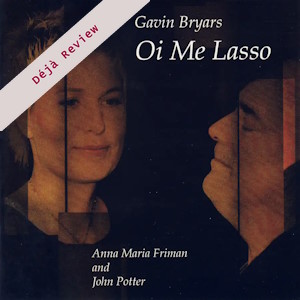
Déjà Review: this review was first published in August 2005 and the recording is still available.
Gavin Bryars (b. 1943)
Oi Me Lasso
Anna Maria Friman (soprano), John Potter (tenor)
Morgan Goff (viola), Nick Cooper (cello), Gavin Bryars (double bass)
rec. date unknown,Trevor Jones Studio, York University, UK
GB Records BCGBCD05 [55]
Laude were 14th century works for unaccompanied soprano, setting texts which were of a sacred nature but which were associated with no particular liturgy and could be quite popular in feel. One source describes them as sermons in verse and music. They were sung by popular confraternities who were not associated with a specific church.
Gavin Bryars has taken Laude from a 14th century manuscript collection from Cortona and used them as the basis for a series of fascinating works. When composing the new works he respects the original laude on which they were based, trying to keep to the same number of notes per syllable as the medieval originals, often making the contours of his music follow the medieval and sometimes quoting individual phrases.
Thus described, the results might be expected to be contrived or dryly academic. In fact, on this disc sung by Swedish soprano Anna Maria Friman, the results are astonishing and ravishing.
It helps of course that Friman, an early music specialist who also sings with the Trio Medieval, has a beautiful voice and knows what to do with it. In this music she brings rich tone to the music, sings with great suppleness and flexibility whilst preserving a lovely sense of line; she makes it all sound completely free and spontaneous, whilst you know that both music and vocalism are really highly controlled.
In his liner notes, Bryars says that he ‘relished the challenge of writing something so exposed, so naked and unadorned, where I cannot hide behind, say, an orchestrated accompaniment or rich harmonies’. Of the fifteen Laude on this disc, four are for solo soprano; for the remainder Bryars variously adds John Potter’s evocative tenor, Morgan Goff’s viola, Nick Cooper’s cello and Bryars’ own double-bass.
Potter is often called upon to provide a drone accompaniment to Friman’s free flowing, melismatic soprano, but sometimes this develops into an organum like accompaniment. On one memorable Lauda, “Lauda vollio per amore”, Friman provides a drone to Potter’s melody.
The results are not pastiche, you would never mistake these pieces for early music, but they represent a fascinating melding of early music with modern sensibility. They are minimal, in the sense that Bryars uses his forces with a wonderful economy; small gestures conjure whole worlds. The results are contemplative but never boring, musically interesting but never busy.
There is something of the sense of the piano etude about these pieces. Bryars states that he writes them quickly, in a matter of hours. Each Lauda seems to embody a particular concern or idea; for instance the double bass in O divina virgo, flore hints at the possibilities of jazz. In a number of Laude Bryars relishes the sheer distance between soprano and double-bass. In Omne homo the use of a refrain and a plucked bass conjures up images of variations on a ground bass. The sense of medieval organum is something that wanders into a number of these pieces, but Bryars does not restrict himself and a sense of more classical/romantic harmony can be felt as well. In the final track, Amore dolçe sença pare, Bryars manages to combine a very real medieval feel with some surprisingly tough harmonies. In other pieces, such as the solo soprano Regina sovrana the medieval melodic outlines are distorted using wide leaps in the vocal line, to very great effect.
I have nothing but praise and envy for these performers; they capture the essence of Bryars’ fascinating pieces and show precious few technical faults. Bryars has so far written some forty-one Laude (there are fifteen on this disc) and with an interpreter as ravishing as Anna Maria Friman you cannot help but understand his inspiration and hope that he will go on writing more.
I found these pieces endlessly fascinating and hauntingly beautiful, but I am very aware that Bryars’s concerns to cross the boundaries between early music and contemporary chime in with my own concerns as a composer. These pieces might not be to everyone’s taste. But I hope that the release of this disc, on Bryars’ own label will encourage as many people as possible to try out what is beautifully approachable music which never talks down. This will be one of my discs of the year.
Robert Hugill
Buying this recording via a link below generates revenue for MWI, which helps the site remain free


Contents
Lauda 17 Ave vergene gaudente
Lauda 4 Oi me lasso
Lauda 29 O divina virgo, flore
Lauda 26 Plangiamo quell crudel basciar
Lauda 6 Da ciel venne messo novella
Lauda 13 Stomme allegro
Lauda 19 Omne homo
Lauda 10 O Maria d’omelia
Lauda 27 Lauda vollio per amore
Lauda 8 Regina sovrana
Lauda 12 Alta trinita beata
Lauda 15 O Maria dei cella
Lauda 9 Ave dei genitrix
Lauda 16 Laudamo la resurrectione
Lauda 28 Amor dolçe sença pare

















